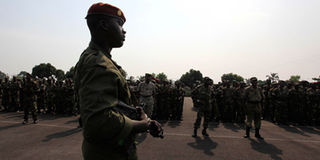Breaking News: Old Kijabe dam tragedy: Death toll rises to 45
I shot Guinea leader, says dissident soldier

Guinean soldiers, loyal to Defence Minister Sekouba Konate, parade at Alpha Yaya Diallo military camp in the capital Connakry, December 11, 2009. REUTERS
DAKAR, Wednesday
A Guinean renegade soldier who attempted to assassinate the country’s military junta leader early this month has for the first time spoken out and claimed responsibility for the act.
Lieutennat Abubakar Diakite, who was junta leader Captain Moussa Dadis Camara’s senior body guard, in an interview with a foreign news reporter on Tuesday night, acknowledged the assassination attempt and argued he did it in “self defence.”
“I did it because I did not want to wait to be killed,” the renegade soldier opined in a telephone interview with a correspondent of Radio France International (RFI) reporter.
Although neither the reporter nor the soldier did say where they were speaking from, it is widely believed that Lt Diakite, alias, Toumba, is still within the territorial limits of the country.
He insisted that he shot at his former boss “due to an act of betrayal…a betrayal of my integrity and a betrayal of democracy,” the soldier explained. “I shot him because they do not want to tell the truth and want to blame me alone for the September 28 event…and so I had to react before he killed me.”
Toumba explained that “Dadis wanted to kill me over the allegation that I masterminded the killing of the civilian protesters on 28 September, but that is not true!”
On the very day of the assassination attempt, Toumba said “Capt Camara came looking for me at Koundara military base (in Conakry) accompanied by all of his convoy with the view to arrest me. Then one of his guards tried to approach me and it was at that moment that I opened fire on him”.
He recalled that one of the two bullets he fired hit the right side of the back of Captain Camara’s neck.
He said “on the very day of the incident, I was among the few soldiers who managed to save the opposition politicians from being killed while some of our colleagues opened fire indiscriminately on the crowd.”
Lt Diakhité squarely attributed the carnage on Captain Camara and some of his senior colleagues and disclosed that a group of about 250 newly trained para-military troops were armed with knives and ordered to attack , injure and kill anyone in the crowd.
This testimony seems to run in perfect rhythm with reports of dozens of sharp and very deep cuts and injuries in the stomachs and chests of young victims and mainly men in their teens and early twenties that were displayed and shot by an amateurish video footage.
“I was not there in the stadium when the shooting was taking place, but I managed to be there before the event ended and managed to save lives,” Toumba claimed.
“But I won’t surrender myself in to the junta,” he whined, and concluded: “they (junta) know the entire truth about what happened and who is responsible for the killing of the people.”
The incident left 157 killed, hundreds injured, 44 missing while dozens of women and girls were assaulted and raped.
Since nearly five months now, Guinea has been plunged into an interminable chaos stemming from a politico-military stalemate between the junta and the civilian politicians and civil society organizations grouped under a coalition dubbed “Forces Vives”.
The bone of contention stems from the junta leader’s predictable stance that he would contest the February presidential elections in spite of promises he had made earlier to the contrary.




